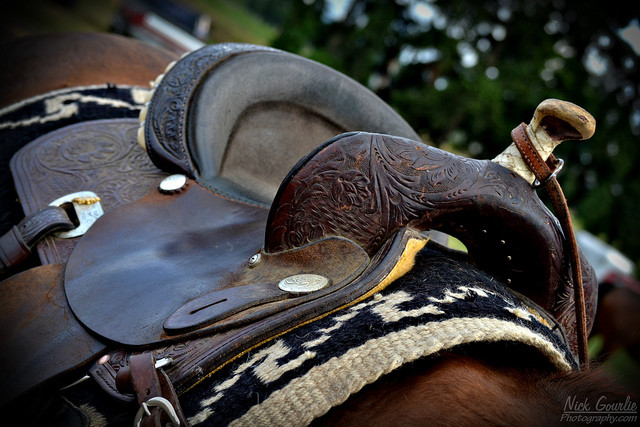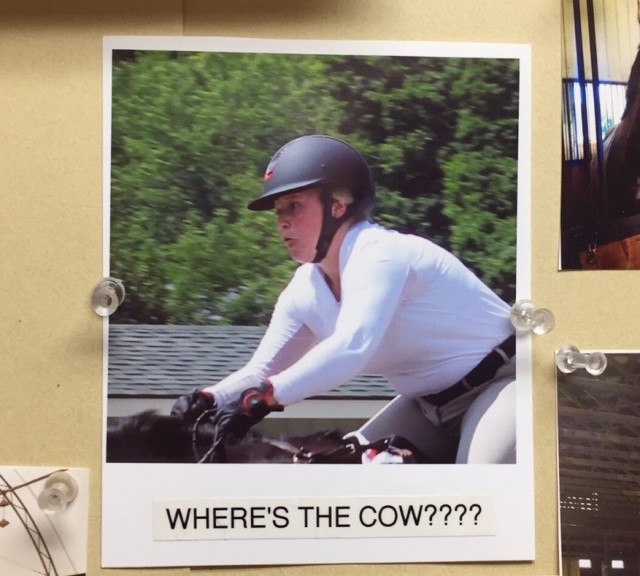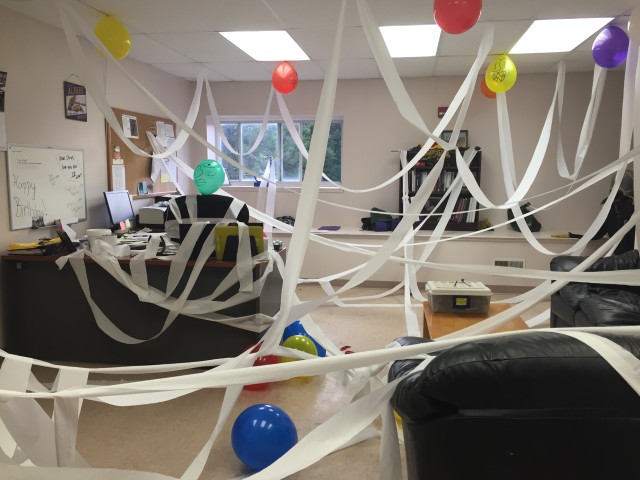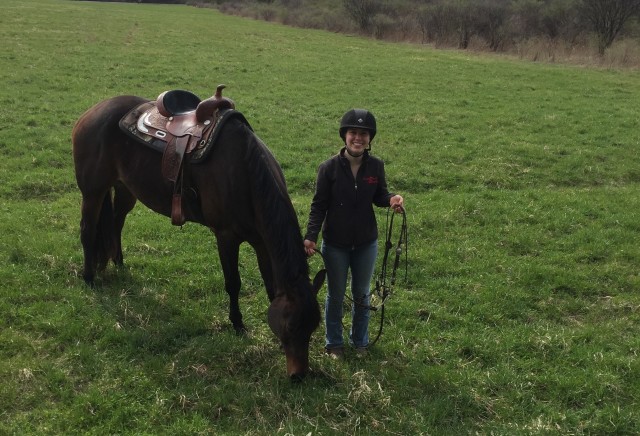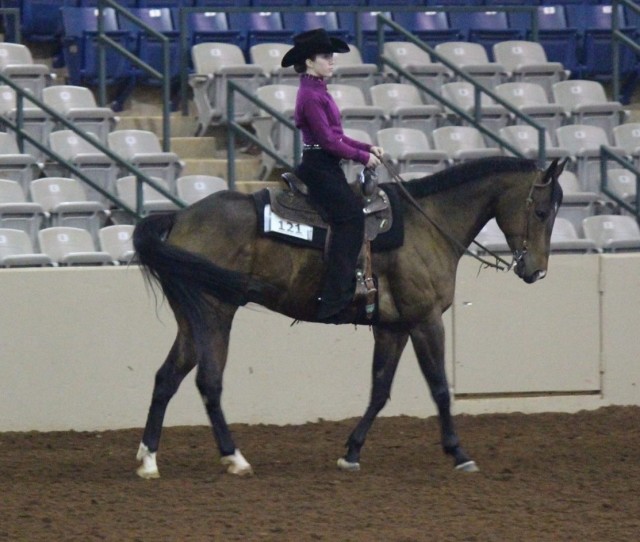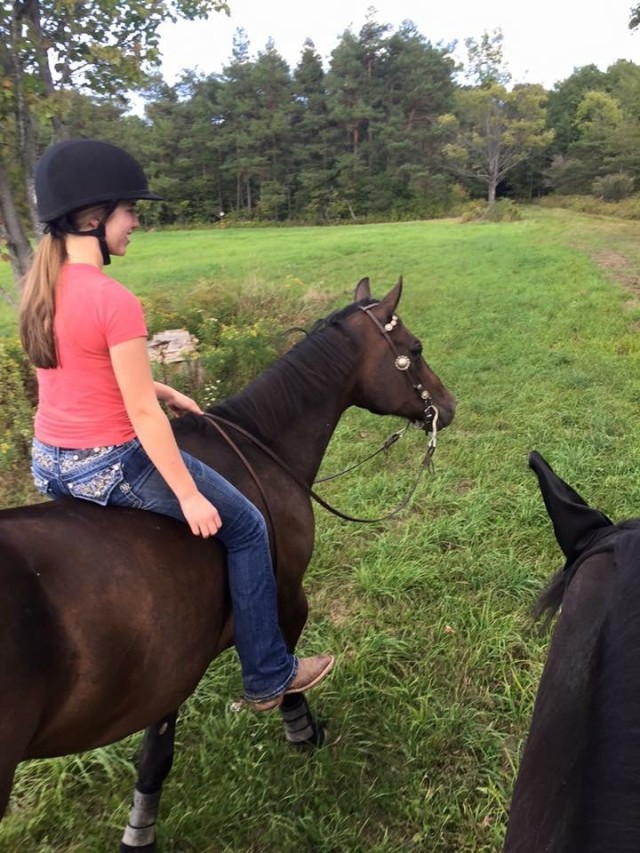#ACADEMIC EQUESTRIAN
The Academic Equestrian: A Musical Freestyle Final
Haley Ruffner just took — and likely passed — the most exciting final exam of her academic career, the musical freestyle reining for her Reined Cowhorse class.
The Academic Equestrian: Up Before Dawn
Haley Ruffner, our collegiate blogger, contends with the fine line between dedication and healthy time management as finals loom closer.
The Academic Equestrian: Lessons From Dad
Haley Ruffner, home from college for Thanksgiving, spends some time with her non-horsey dad and reflects on the equestrian lessons she’s learned from him.
The Academic Equestrian: Fraternizing With the Enemy
Everything is fun and games at Haley’s intercollegiate horse shows … except for the fact that her mother coaches an opposing team.
The Academic Equestrian: A Birthday Surprise
Haley gets the best birthday gift ever.
The Academic Equestrian: Back to the Gym
Haley Ruffner, our collegiate equestrian blogger and captain of her university western team, contends with some leadership and fitness challenges out of the riding arena.
The Academic Equestrian: Freestylin’
Haley Ruffner is already looking forward to final exams — or at least one particular exam for her Reined Cowhorse class.
The Academic Equestrian: Judges Are Humans Too
Halfway through her semester of “Judging Horse Shows” (seriously, college classes are SO cool these days), Haley Ruffner is still seeking that confident cool decision-making that all judges possess … don’t they?
The Academic Equestrian: Cow Horse for College Credit
Haley Ruffner, our collegiate equestrian blogger, is taking a course in reined cow horse — yep, for college credit.
The Academic Equestrian: Working On My Fitness
There’s more to rider fitness than just riding.
The Academic Equestrian: Hero to Zero
Haley’s first show of the season didn’t quite go as planned.
Academic Equestrian: Team Captain
Haley Ruffner, our intercollegiate equestrian blogger, has been named team captain!
Academic Equestrian: Happy Birthday, Coach
The best way to give back to your hardworking equestrian team coach is to artfully destroy his office on his birthday. Haley Ruffner explains.
The Academic Equestrian: Back to School
Haley Ruffner is back for her sophomore year!
The Academic Equestrian: Finals Week
Haley’s pushing through finals week of her spring semester, and draws a few parallels between muddling through her exams and riding a horsemanship pattern.

This photo is from a trail ride during which Cricket somehow unbridled himself so that he could graze, which kind of set the tone for finals week in that I’m not sure what I’m supposed to do and I’m mildly stressed. Photo by Ellie Woznica.
Finals week is upon us, and as the week draws to a close I can look back on my tests and all the anxiety with some humor. (Even though I do still have one test on Saturday. Who gives tests on a Saturday?!)
I’ve started to look at final exams like I do horsemanship patterns, but with less excitement and more nerves, and instead of a ribbon I hope for a passing grade. I study for both tests and horsemanship patterns, but both are more successful if I’ve been practicing consistently instead of cramming right before. Below are some steps, pattern-style, to get through a final exam.
- Enter at a jog because, let’s face it, you’re probably late.
- Halt in the doorway long enough to ensure that you are in the correct classroom.
- Nod at the professor, proceed at a walk.
- Perform a square corner at a desk row of your choosing.
- Step over book bags and other obstacles until you reach your selected desk.
- Place book bag on ground, turn 90 degrees on the haunches, and sit down.
- Remove working pen or pencil from your bag. Penalty points may be given if this step is skipped.
- Open test booklet and perform any and all maneuvers as directed.
- When finished, stand and turn 90 degrees in the opposite direction. Walk to professor without hitting students, book bags, or desks.
- Hand in test, hesitate to demonstrate completion, then exit at an extended lope.
Crying and laughing are permitted once a distance of at least 25 feet between student and classroom has been attained. Crying during the test can result in a steep penalty.
And now it’s time for summer vacation for me — I hope you enjoyed “riding along” for my first year of college! I’ll be back in the fall, so until then, go riding!
Haley is the author of Horse Nation’s “Academic Equestrian” series, following her collegiate experience as she balances her studies with participation on the varsity equestrian team and time with her own horse. Catch up on past columns by clicking the #ACADEMIC EQUESTRIAN tag at the top of the page!
Haley Ruffner is attending Alfred University, majoring in English and minoring in Business and Equestrian Studies. She has a green Quarter Horse, At Last an Invitation “Cricket,” and he is also “enrolled” at Alfred. She rides western and hunt seat and also loves to rein and trail ride.
If Equestrians Treated Other Humans Like Horses
Haley Ruffner, wrapping up her first year of university, imagines if she could treat her fellow students the same way she treats her horse.
As the last week before finals draws to a close, it is safe to say that I’ve reached the point in the semester where I much prefer my horse’s company to that of any human. Living in close quarters with hundreds of my peers has made me grateful for the comparative simplicity of horse-human relationships. Without fighting or even two-sided conversations, Cricket and I communicate more effectively than some of my classmates. The thought of responding to other people like I do to horses is both amusing and oddly comforting.
1. Using food as a bribe. Ideally, I could present baby carrots to classmates either as a reward or incentive for good behavior, after which they would be extra friendly and keep up the good work in hopes of more carrots.
2. Reinforcing ground manners. While most people understand the concept of personal space, there are certainly some that could use a firm push to the chest or quick stop-and-back to let them know that it’s not okay to shoulder through someone.
3. Relying on voice commands. For some reason, saying “excuse me” and poking someone in the side doesn’t go over as well with people as it does horses. In both, the “excuse me” is sometimes ineffective, but with people it’s customary to keep saying it louder until they notice or go around them. “Whoa” means something other than “stop” in horse muggle language, so that command won’t work. Even a crisp cluck or kiss doesn’t go very far with people, which is a shame.
4. Pasture behavior. If I need to get my horse from the pasture, I refer to number 1 or just go out with a halter and lead rope and hope for the best. Polite thing that he is, he usually comes to see me. Trying to catch up with certain people outside of the classroom, on the other hand, take extensive bribing, calling and planning to track them down.
5. Bad attitude. In horses, ears back and a threatening snap earns them an attitude adjustment. If the grumpiness is consistent, vets are called to ensure the issue isn’t pain anywhere, and in most cases that solves it. Some horses do have bad attitudes, but they learn to channel it into something productive, find a different job, or focus the attitude on one behavior (how many girthy horses do you know?). However, lots of people are grumpy most of the time for no reason at all and make no attempt to change it. A growl and firm attitude adjustment would be gratifying but, alas, entirely inappropriate.
What would you add to the list?
Haley is the author of Horse Nation’s “Academic Equestrian” series, following her collegiate experience as she balances her studies with participation on the varsity equestrian team and time with her own horse. Catch up on past columns by clicking the #ACADEMIC EQUESTRIAN tag at the top of the page!
Haley Ruffner is attending Alfred University, majoring in English and minoring in Business and Equestrian Studies. She has a green Quarter Horse, At Last an Invitation “Cricket,” and he is also “enrolled” at Alfred. She rides western and hunt seat and also loves to rein and trail ride.
#TBT: 4 Ways to Horse Show with Late Risers
Better buy stock in the coffee company now.
The Academic Equestrian: Spring, Exams and Mud
The eternal debate continues: study for exams, or go riding? Haley, the Academic Equestrian, describes how she balances both.
Spring, it seems, has finally made its way to Alfred, melting the last snow heaps into thick mud puddles and releasing Cricket’s winter coat. My boots are muddy and my jackets are all covered in horsehair, but somehow none of that seems quite so bad because it also means that it’s nice enough to ride outside again.
As my second semester of college comes to a close, the improving weather seems both a blessing and a curse — how am I supposed to lock myself inside to study for finals when the sun is shining and the temperature is above freezing? In hindsight, fall semester finals are much easier to prepare for, since due to dismal December weather, there is nothing else to do besides sit indoors and study. Everything in me wants to look ahead — to summer, to the first open horse show of the year (this weekend!), to trail riding at home and summer jobs. The one blip in my schedule is finals week, coming up soon and promising to be stressful and difficult.
My book bag is a constant companion, whether I am walking to breakfast, going to the barn, or riding in the car with my roommate on a coffee run. This, I think, is my subconscious way of compensating for the hours I spend at the barn trying to make my animal look like a non-feral well-groomed horse. Homework on the go has proven to be an effective method of keeping up. Sitting alone at lunch? Do some homework. Someone you don’t like is talking to you? Pull out that study sheet. Awake for a midnight snack? Go over the day’s reading. Horse is behaving during a lesson? Set your laptop on the pommel of your saddle and organize your essay. Horse isn’t paying attention to you? Tape flash cards to your horse’s ears and memorize both sides as they rotate them. Go big or go home.
At the end of the day, even with having to keep up with homework and take care of Cricket, I’m glad that he’s there to shed all over every piece of clothing I own and slobber in my hair. It’s impossible to be stressed when you slog out to the pasture to catch your horse and instead encounter an indistinguishable mud monster who is oh-so-proud of himself. He’ll share the love with you too, pressing a muzzle encrusted with mud and hay into your hand and breathing softly, and in the moment you know that this peace is more memorable than any final exam you’ll ever take.
Haley is the author of Horse Nation’s “Academic Equestrian” series, following her collegiate experience as she balances her studies with participation on the varsity equestrian team and time with her own horse. Catch up on past columns by clicking the #ACADEMIC EQUESTRIAN tag at the top of the page!
Haley Ruffner is attending Alfred University, majoring in English and minoring in Business and Equestrian Studies. She has a green Quarter Horse, At Last an Invitation “Cricket,” and he is also “enrolled” at Alfred. She rides western and hunt seat and also loves to rein and trail ride.
4 Ways Going to College Is Like Horse Showing
The Academic Equestrian reports.
The Academic Equestrian: Haley’s Secret to Success
Haley opens up with the truth about her IHSA season.
The Academic Equestrian: All Good Things Must End
Even a disappointing end to the season has a bright side.
The Academic Equestrian: How to Horse Show
A helpful guide to the organized chaos.
Academic Equestrian: You Can Take the Girl Out of the Barn …
… but the horse smell stays with her.
The Academic Equestrian: A Good Coach Is Hard to Find
Between the end of the regular season and the start of the post-season, collegiate blogger Haley Ruffner discusses the importance of good coaching.
In the Intercollegiate Horse Show Association, good coaches are arguably the most valuable asset a team can have. They shape riders’ potential into skill, serve as role models for the team, and inspire us to be the best that we can be. As this season draws to a close, I am grateful for my coaches Harry Hurd and Steve Shank for pushing me to improve. Every year they claim that the team is stronger this year than the year before, and everyone’s heard it enough that we laugh and roll our eyes—but every year, it seems like there are more riders to qualify for post-season and an overall more confident team.
Our coaches make us proud to wear that Alfred University jacket, and we seek their approval more than the judge’s. It’s a feeling like no other to enter the arena knowing you have an entire team watching and supporting you, as well as two coaches who stand behind you through wins and train wrecks alike. The pressure from watchful eyes makes you square your shoulders, lift your chin, press your heels down and ride the best that you can. At the end of the day, your best is all you can give — and if it isn’t good enough, your best effort that day is turned into a learning experience for future shows.
What I thought was good horsemanship for me has evolved over the year thanks to my coaches’ nonstop instruction. I’m sure it’s getting old when they have to tell me yet again to keep more weight in my stirrups or ride with more effective hands or be more precise on downward transitions, but I appreciate so much that they haven’t given up on me. They might roll their eyes or give me grief for a mistake I’ve made, but they maintain a positive attitude and help me to understand what I’m doing wrong, why it’s happening and how to fix it. I don’t know how it is that they manage to refrain from saying, “That was awful” or “What are you doing?” through even the ugliest of rides; their professionalism through every situation inspires like behavior from the riders. We learn to dwell on mistakes only as long as it takes to fix them, and even then to do so in a manner that maintains sportsmanship and class.
Our coaches are the second set of parents that everyone needs at college—they hold us to a high standard of behavior, they lead by example, they keep us in line (although I would argue that we keep them in line as well), and they bring out the best in all of us. Going into our first postseason show this weekend, I am thankful for our wonderful Alfred University coaches and their hard work that often goes unrecognized.
Haley is the author of Horse Nation’s “Academic Equestrian” series, following her collegiate experience as she balances her studies with participation on the varsity equestrian team and time with her own horse. Catch up on past columns by clicking the #ACADEMIC EQUESTRIAN tag at the top of the page!
Haley Ruffner is attending Alfred University, majoring in English and minoring in Business and Equestrian Studies. She has a green Quarter Horse, At Last an Invitation “Cricket,” and he is also “enrolled” at Alfred. She rides western and hunt seat and also loves to rein and trail ride.












